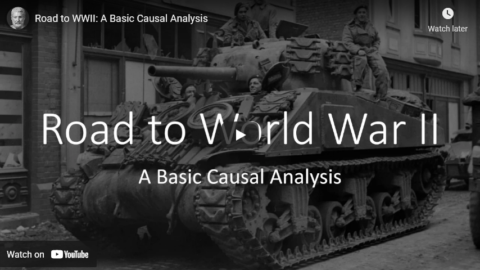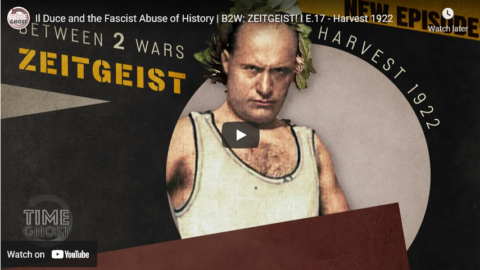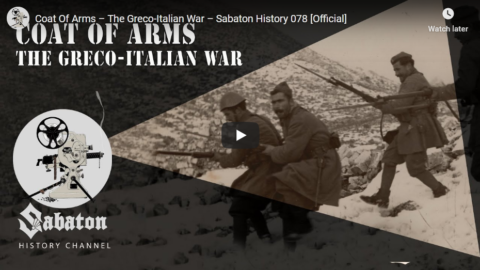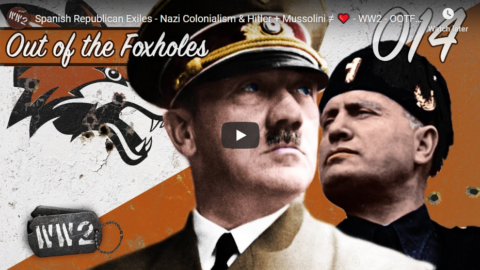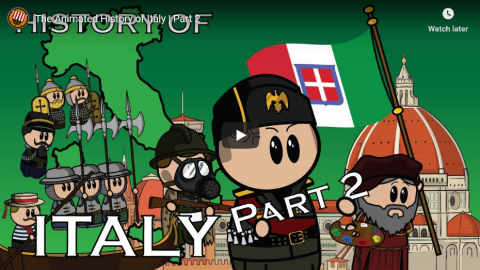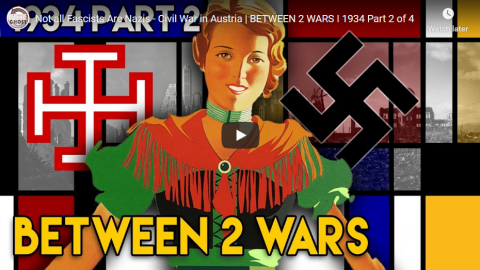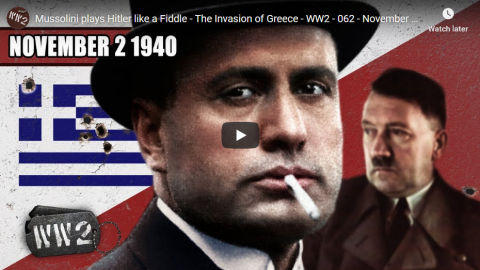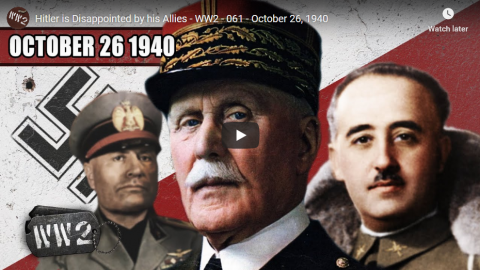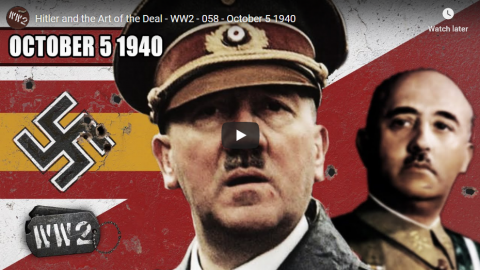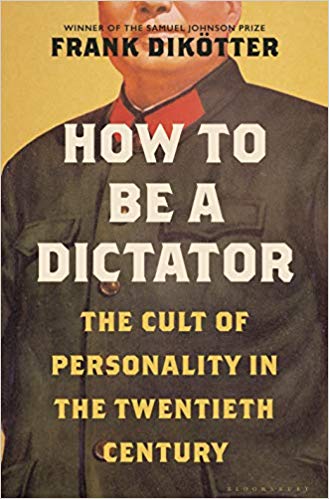Thersites the Historian
Published 19 Nov 2019This video is a primer for undergraduates in broad history survey courses that will hopefully help make sense of the interwar years between World War I and World War II.
Patreon link: https://www.patreon.com/thersites
PayPal link: paypal.me/thersites
Twitter link: https://twitter.com/ThersitesAthens
Minds.com link: https://www.minds.com/ThersitestheHis…
Steemit/dtube link: https://steemit.com/@thersites/feed
BitChute: https://www.bitchute.com/channel/jbyg…
Backup Channel: https://www.youtube.com/channel/UCUrD…
September 2, 2021
Road to WWII: A Basic Causal Analysis
September 1, 2021
QotD: The power of nationalistic feelings
As I write, highly civilized human beings are flying overhead, trying to kill me.
They do not feel any enmity against me as an individual, nor I against them. They are “only doing their duty”, as the saying goes. Most of them, I have no doubt, are kind-hearted law-abiding men who would never dream of committing murder in private life. On the other hand, if one of them succeeds in blowing me to pieces with a well-placed bomb, he will never sleep any the worse for it. He is serving his country, which has the power to absolve him from evil.
One cannot see the modern world as it is unless one recognizes the overwhelming strength of patriotism, national loyalty. In certain circumstances it can break down, at certain levels of civilization it does not exist, but as a positive force there is nothing to set beside it. Christianity and international Socialism are as weak as straw in comparison with it. Hitler and Mussolini rose to power in their own countries very largely because they could grasp this fact and their opponents could not.
George Orwell, “The Lion And The Unicorn: Socialism and the English Genius”, 1941-02-19.
May 6, 2021
Il Duce and the Fascist Abuse of History | B2W: ZEITGEIST! I E.17 – Harvest 1922
TimeGhost History
Published 5 May 2021The modern age is an age of modern things. But it is also an age when people yearn for times past. One of the main men to weaponize this yearning is Benito Mussolini, and this season, he moves to recreate the Roman Empire in his fascist image.
Get your own Indy Neidell Tie here: https://www.youtube.com/channel/UC4Mi…
Join us on Patreon: https://www.patreon.com/TimeGhostHistory
Hosted by: Indy Neidell
Written by: Francis van Berkel
Director: Astrid Deinhard
Producers: Astrid Deinhard and Spartacus Olsson
Executive Producers: Astrid Deinhard, Indy Neidell, Spartacus Olsson, Bodo Rittenauer
Creative Producer: Maria Kyhle
Post-Production Director: Wieke Kapteijns
Research by: Francis van Berkel and Timothy Smith
Image Research by: Lucas Aimo
Edited by: Lucas Aimo
Sound design: Marek KamińskiColorizations:
– Daniel Weiss
– Mikołaj UchmanArchive by Screenocean/Reuters https://www.screenocean.com.
A TimeGhost chronological documentary produced by OnLion Entertainment GmbH.
From the comments:
TimeGhost History
2 days ago (edited)
The only thing more interesting than learning about history is learning about how people in history learned about history.For starters, it is just interesting in itself. Anyone with a passion for history will want to hear about the circumstances of how a new discovery was made or how certain historical narratives were preserved over time. But more analytically, looking at how a society understood its history can tell you a lot about that society understood itself and the contemporary world around it. That second point is particularly true of the modern age. Ironically, it is a very modern “thing” to be so aware of history. Indeed, the modern age saw the birth of the museum, of nationalist histories, and even the concept of what “History” itself was (note the capital H).
It’s such a massive topic and one that perhaps isn’t suited to a single pinned comment. Interested in learning more? Maybe we’ll do another video on it someday. In the meantime, you can read up the works of Reinhart Koselleck … that should keep you occupied.
December 10, 2020
July 31, 2020
“Coat Of Arms” – The Greco-Italian War – Sabaton History 078 [Official]
Sabaton History
Published 30 Jul 2020Morning of October 28th, 1940.
The Italian ambassador to Greece had entered the house of Greek Prime Minister Ioannis Metaxas. An unacceptable ultimatum in hand, he demanded subjugation under Italian rule. Refusal would mean war. An ardent Ochi! was the answer. No, the Greek would not bow to fascist demands, but instead fight for the defense of their country and their honor. What followed were months of bitter fighting in the harsh environment of Epirus and the Macedonian mountains.
The Greco-Italian War.
Support Sabaton History on Patreon: https://www.patreon.com/sabatonhistory
Listen to “Coat Of Arms” on the album Coat Of Arms:
CD: http://bit.ly/CoatOfArmsStore
Spotify: http://bit.ly/CoatOfArmsSpotify
Apple Music: http://bit.ly/CoatOfArmsAppleMusic
iTunes: http://bit.ly/CoatOfArmsiTunes
Amazon: http://bit.ly/CoatOfArmsAmzn
Google Play: http://bit.ly/CoatOfArmsGooglePlayWatch the Official Music Video of “Coat Of Arms” here:
https://youtu.be/wtax3Fl-UZoThe episode of WW2 in Real-Time Indy was talking about: https://www.youtube.com/watch?v=GYznP…
Listen to Sabaton on Spotify: http://smarturl.it/SabatonSpotify
Official Sabaton Merchandise Shop: http://bit.ly/SabatonOfficialShopHosted by: Indy Neidell
Written by: Markus Linke and Indy Neidell
Directed by: Astrid Deinhard and Wieke Kapteijns
Produced by: Pär Sundström, Astrid Deinhard and Spartacus Olsson
Creative Producer: Joram Appel
Community Manager: Maria Kyhle
Executive Producers: Pär Sundström, Joakim Broden, Tomas Sunmo, Indy Neidell, Astrid Deinhard, and Spartacus Olsson
Post-Production Director: Wieke Kapteijns
Edited by: Karolina Dołęga
Sound Editing by: Marek Kaminski
Maps by: Eastory – https://www.youtube.com/c/eastory
Archive by: Reuters/Screenocean https://www.screenocean.com
Music by SabatonSources:
Bundesarchiv
Narodowe Archiwum Cyfrowe
Imperia War Museums: 205197881
Diplomatic and Historical Archive Department
Italian map by F l a n k e r from Wikimedia
The icons from Noun Project: Oksana Latysheva, Wichai Wi, baken studio, ProSymbolsAn OnLion Entertainment GmbH and Raging Beaver Publishing AB co-Production.
© Raging Beaver Publishing AB, 2019 – all rights reserved.
July 21, 2020
Spanish Republican Exiles – Nazi Colonialism & Hitler + Mussolini ≠ ❤️ – WW2 – OOTF 014
World War Two
Published 16 Jul 2020What did Spanish Republicans do during the Second World War? How would the Axis have divided Africa? And did Hitler plan to keep Mussolini around after the war? Find out as Indy and the Chair of Infinite Knowledge answer three more intriguing questions in this episode of Out of the Foxholes!
Join us on Patreon: https://www.patreon.com/TimeGhostHistory
Or join The TimeGhost Army directly at: https://timeghost.tvSubmit your own question for Out of the Foxholes here: https://community.timeghost.tv/c/Out-…
Follow WW2 day by day on Instagram @World_war_two_realtime https://www.instagram.com/world_war_two_realtime
Between 2 Wars: https://www.youtube.com/playlist?list…
Source list: http://bit.ly/WW2sourcesHosted by: Indy Neidell
Written by: Rune Væver Hartvig
Director: Astrid Deinhard
Producers: Astrid Deinhard and Spartacus Olsson
Executive Producers: Astrid Deinhard, Indy Neidell, Spartacus Olsson, Bodo Rittenauer
Creative Producer: Joram Appel
Post-Production Director: Wieke Kapteijns
Research by: Rune Væver Hartvig
Edited by: Karolina Dołęga
Sound design: Marek Kamiński
Map animations: Karolina DołęgaVisual Sources:
Bundesarchiv
US Holocaust Memorial Museums
Library of Congress Geography and Map Division
Nasjonalbiblioteket from Norway
Icons from The Noun Project by: Milinda Courey, Eucalyp, Luis Prado, Gan Khoon Lay, DonBLC, Pavel N and Rigo PeterMusic:
“Deviation In Time” – Johannes Bornlof
“Superior” – Silver Maple
“Underlying Truth” – Howard Harper-BarnesArchive by Screenocean/Reuters https://www.screenocean.com.
A TimeGhost chronological documentary produced by OnLion Entertainment GmbH.
February 13, 2020
The Animated History of Italy | Part 2
Suibhne
Published 23 Apr 2018The Armchair Historian Collab: https://youtu.be/vGM54x0LsII
Beginning part two, Italy has been recaptured by the Byzantines thanks to the tenacious ambitions of Emperor Justinian. But throughout the Middle Ages, the land became a battleground for more powerful empires. The 19th Century Italian revolution would see the peninsula swept up in the waves of nationalism that was taking the continent by storm.
November 8, 2019
Not all Fascists Are Nazis – Civil War in Austria | BETWEEN 2 WARS I 1934 Part 2 of 4
TimeGhost History
Published 7 Nov 2019Austria is very divided in the 1930s. Austrian Nationalism opposes the idea of a Greater German Reich, which triggers the emergence of Austrofascism. They find themselves in a violet struggle against Nazis, Communists, Democrats and Socialists.
Join us on Patreon: https://www.patreon.com/TimeGhostHistory
Hosted by: Indy Neidell
Written by: Spartacus Olsson, Joram Appel and Francis van Berkel
Directed by: Spartacus Olsson and Astrid Deinhard
Executive Producers: Bodo Rittenauer, Astrid Deinhard, Indy Neidell, Spartacus Olsson
Creative Producer: Joram Appel
Post-Production Director: Wieke Kapteijns
Research by: Naman Habtom, Joram Appel and Francis van Berkel
Edited by: Daniel Weiss
Sound design: Marek KaminskiColorized pictures:
– Daniel Weiss,
– Julius Jääskeläinen (https://www.facebook.com/JJcolorization/),
– Dememorabilia (https://instagram.com/dememorabilia)Sources:
– Image sources: Bundesarchiv, Bundesarchiv, Bild_183-R36187/102-10358/102-00842A/102-00836/102-00840/102-00839/102-09844. Fortepan_28800(FOTOFORTEPAN MZSLOfner Károly)
– Icons from the Noun Project: School by David, college by anbileru adaleru, Law by Delwar Hossain, Parliament by Gerald Wildmoser, Diploma by Alena, guns by Cards Against Humanity, poll by Bastien Ho,A TimeGhost chronological documentary produced by OnLion Entertainment GmbH.
From the comments:
TimeGhost History
2 days ago (edited)
A lot comes together in this episode. Austria in 1934 is where a lot of political movements, ideologies and methods we saw throughout the ’20s and ’30s in previous episodes go head to head. We explain how Austro-Fascism differs from fascism and how Nazism and Austrofascism engage in a violent clash.So, this episode covers Communism, Fascism, Austrofascism and Nazism in the context of Austria in 1934. I can predict some of the comments that will appear under this video, so allow me to explain how we interpret and explain the key differences between some of these. In academia, we use a right-left axis to place political movements on based on their ideology, NOT just because of their methods or form of state. Our definition is not politically motivated or does not relate to current day politics. We only apply this definition to the specific historical context of the interwar era and World War Two. In short: totalitarian or authoritarian governments are not all the same. Fascism and Nazism are generally placed on the right because they were driven by state or race superiority, Communism and Socialism are placed on the left as they were driven by class-differences and (theoretical) equality.
Granted, there is a rich scholarly debate surrounding the function and interpretation of the left-right axis. Anyone who is interested to read more about that can read ‘Andrew Heywood, Political Ideologies: An Introduction (2017) 15-17.’ However, there are limits to what is accepted as an academic argument and what is plain propaganda. Socialism and Nazism are not the same by any respectable definition. Communism and Nazism both embracing totalitarian regimes does not make them the same. We love to engage in debates about this, and we will do so with anyone who presents a real argument with real examples and sources. We will not engage with trolls who are politicising this historical debate with a modern-day agenda.
Cheers,
Joram
November 3, 2019
Mussolini plays Hitler like a Fiddle – The Invasion of Greece – WW2 – 062 – November 2, 1940
World War Two
Published 2 Nov 2019A new front opens up in Greece as the Italians invade, while the Battle of Britain seems to come to an end.
Join us on Patreon: https://www.patreon.com/TimeGhostHistory
Or join The TimeGhost Army directly at: https://timeghost.tvFollow WW2 day by day on Instagram @World_war_two_realtime https://www.instagram.com/world_war_t…
Join our Discord Server: https://discord.gg/D6D2aYN.
Between 2 Wars: https://www.youtube.com/playlist?list…
Source list: http://bit.ly/WW2sourcesWritten and Hosted by: Indy Neidell
Produced and Directed by: Spartacus Olsson and Astrid Deinhard
Executive Producers: Bodo Rittenauer, Astrid Deinhard, Indy Neidell, Spartacus Olsson
Creative Producer: Joram Appel
Post-Production Director: Wieke Kapteijns
Research by: Indy Neidell
Edited by: Iryna Dulka
Map animations: EastoryColorisations by Norman Stewart and Julius Jääskeläinen https://www.facebook.com/JJcolorization/
Sources:
– IWM: HU 76031, E 15223, E 450, E 6661, A 22111
– killer by Arthur Shlain from the Noun Project
– National Portrait Gallery, London
– Torpedo body icon by Blaise Sewell from the Noun Project
– FDR Presidential Library & MuseumEastory’s channel: https://www.youtube.com/channel/UCEly…
Archive by Screenocean/Reuters https://www.screenocean.com.A TimeGhost chronological documentary produced by OnLion Entertainment GmbH.
From the comments:
World War Two
3 days ago (edited)
This week covers about two major events with effects that will ripple through the remainder of the war. Actually, both have been attributed by historians for being “the one event” that caused the war to end as it did. You’ll have to stick around to find out how and when that will be though. Though I can tell you one thing now. History is rarely that simple. If you like our series and want to enable us to cover the complex web of events, locations, individuals and techniques that changed the outcome of the war, please consider supporting us on https://www.patreon.com/timeghosthistory or on our own website at https://timeghost.tv. If you would like to make a one-time contribution, you can do so via PayPal to (paypal@timeghost.tv).
Cheers, Joram
October 27, 2019
Hitler is Disappointed by his Allies – WW2 – 061 – October 26, 1940
World War Two
Published 26 Oct 2019Hitler finds out that not everyone is ready to do his bidding. Much to the frustration of Hitler, Franco, Petain and Mussolini all have their reasons to take the high road.
Join us on Patreon: https://www.patreon.com/TimeGhostHistory
Or join The TimeGhost Army directly at: https://timeghost.tvFollow WW2 day by day on Instagram @World_war_two_realtime https://www.instagram.com/world_war_t…
Join our Discord Server: https://discord.gg/D6D2aYN.
Between 2 Wars: https://www.youtube.com/playlist?list…
Source list: http://bit.ly/WW2sourcesWritten and Hosted by: Indy Neidell
Produced and Directed by: Spartacus Olsson and Astrid Deinhard
Executive Producers: Bodo Rittenauer, Astrid Deinhard, Indy Neidell, Spartacus Olsson
Creative Producer: Joram Appel
Research by: Indy Neidell
Edited by: Karolina Dołęga
Map animations: EastoryColorisations by Norman Stewart and Julius Jääskeläinen https://www.facebook.com/JJcolorization/
Sources: Biplane by Hea Poh Lin from the Noun Project
Eastory’s channel: https://www.youtube.com/channel/UCEly…
Archive by Screenocean/Reuters https://www.screenocean.com.A TimeGhost chronological documentary produced by OnLion Entertainment GmbH.
October 6, 2019
Hitler and the Art of the Deal – WW2 – 058 – October 5 1940
World War Two
Published 5 Oct 2019Hitler is trying to get new Axis Powers on board in his fight against Britain, promising them all huge territorial gains.
Join us on Patreon: https://www.patreon.com/TimeGhostHistory
Or join The TimeGhost Army directly at: https://timeghost.tvFollow WW2 day by day on Instagram @World_war_two_realtime https://www.instagram.com/world_war_t…
Join our Discord Server: https://discord.gg/D6D2aYN.
Between 2 Wars: https://www.youtube.com/playlist?list…
Source list: http://bit.ly/WW2sourcesWritten and Hosted by: Indy Neidell
Produced and Directed by: Spartacus Olsson and Astrid Deinhard
Executive Producers: Bodo Rittenauer, Astrid Deinhard, Indy Neidell, Spartacus Olsson
Creative Producer: Joram Appel
Post-Production Director: Wieke Kapteijns
Research by: Indy Neidell
Edited by: Iryna Dulka
Map animations: EastoryColorisations by Norman Stewart and Julius Jääskeläinen https://www.facebook.com/JJcolorization/
Eastory’s channel: https://www.youtube.com/channel/UCEly…
Archive by Screenocean/Reuters https://www.screenocean.com.Sources:
– IWM: A 220
– Photos of Herbert Morrison and John Anderson by Yousuf Karsh, Dutch National Archives
– National Library of Australia
– Narodowe Archiwum Cyfrowe
– Colorized portrait of Mao Zedong by Olga Shirnina, aka Klimbim
– Flag of Spain by SanchoPanzaXXI on Wikimedia CommonsA TimeGhost chronological documentary produced by OnLion Entertainment GmbH.
September 29, 2019
Being a dictator is a stressful vocation
Gustav Jönsson reviews a new book by Professor Frank Dikötter on twentieth-century dictators:
One of the first things to emerge from Professor Frank Dikötter’s eagerly awaited new book How to Be a Dictator is that it is a stressful vocation: there are rivals to assassinate, dissidents to silence, kickbacks to collect, and revolutions to suppress. Quite hard work. Even the most preeminent ones usually meet ignominious ends. Mussolini: summarily shot and strung upside down over a cheering crowd. Hitler: suicide and incineration. Ceausescu: executed outside a toilet block. Or consider the fate of Ethiopia’s Haile Selassie: rumoured to have been murdered on orders of his successor Mengistu Haile Mariam, he was buried underneath the latter’s office desk. Not the most alluring career trajectory, one might say.
Dikötter’s monograph is a study of twentieth century personality cults. He examines eight such cults: those created by Mussolini, Hitler, Stalin, Mao, Kim Il-sung, Duvalier, Ceausescu, and Mengistu. For them, cultism was not mere narcissism, it was what sustained their regimes; foregoing cultism, Dikötter argues, caused swift collapse. Consider Pol Pot and the Khmer Rouge. Cambodians were unsure of Pol Pot’s exact identity for years, even after he had assumed leadership of the country. The Khmer Rouge, meanwhile, was in its initial stages merely called “Angkar” — “The Organisation.” There was no inspiring iconography. There was no ritualised leader worship. There was only dark terror. Dikötter quotes historian Henri Locard: “Failing to induce adulation and submissiveness, the Angkar could only generate hatred.” The Khmer Rouge soon lost its grip on the country. Dikötter makes an obligatory reference: “Even Big Brother, in George Orwell’s 1984, had a face that stared out at people from every street corner.”
Readers of Orwell will remember that INGSOC has no state ideology. There is only what the Party says, which can change from hour to hour. Likewise, Dikötter argues, there was no ideological core to twentieth century dictatorships; there was only the whim of the dictator. Nazism, for example, was not a coherent creed. It contained antisemitism, nationalism, neo-paganism, etc., but its essence was captured in one of its slogans: The Führer is Always Right. That is what the creed amounted to. Indeed, the NSDAP referred to itself simply as “the Hitler movement.” Nazism was synonymous with Hitlerism. Italian Fascism was perhaps even more vacuous. The regime’s slogan was simple: Mussolini is Always Right. Explaining his method of politics, Mussolini said: “We do not believe in dogmatic programmes, in rigid schemes that should contain and defy the changing, uncertain, and complex reality.”
While it is uncontroversial to argue that Nazism and Fascism were without ideology, as Dikötter writes, the “issue is more complicated with communist regimes.” Naturally, Marxism was connected with Stalin, Mao, Ceausescu, Kim, and Mengistu. But Dikötter rightly says that it was Lenin’s revolutionary vanguard, not Marx’s philosophical works, that inspired them. Doctrines can be interpreted in contradictory ways, creating schismatic movements — as shown throughout the history of socialism. In this regard personality cults are far safer because they are substantively empty. Marxist dictators thus subverted Marxism. Engels had said that socialism in one country was impossible, but that is what Stalin’s Soviet Union favoured. Or consider Kim’s North Korea, which in 1972 replaced Marxism with Great Leader Thought. And as Dikötter writes, “Mao read Marx, but turned him on his head by making peasants rather than workers the spearhead of the revolution.” Reading Marx under Marxism, Dikötter says, was highly imprudent: “One was a Stalinist under Stalin, a Maoist under Mao, a Kimist under Kim.” In short, Marxism was whatever the dictator said, and not what Marx had actually written.
August 24, 2019
Italy’s African Destiny | BETWEEN 2 WARS I 1931 Part 1 of 3
TimeGhost History
Published on 23 Aug 2019When Mussolini wants to solidify Italy’s North African colonies, he faces massive opposition by one man: Omar Mukhtar, the Lion of the Desert.
Join us on Patreon: https://www.patreon.com/TimeGhostHistory
Subscribe to our World War Two series: https://www.youtube.com/c/worldwartwo…
Hosted by: Indy Neidell
Written by: Spartacus Olsson
Directed by: Spartacus Olsson and Astrid Deinhard
Executive Producers: Bodo Rittenauer, Astrid Deinhard, Indy Neidell, Spartacus Olsson
Creative Producer: Joram Appel
Post-Production Director: Wieke Kapteijns
Research by: Naman Habtom
Edited by: Daniel Weiss
Sound design: Iryna DulkaArchive by Reuters/Screenocean http://screenocean.com
Sources:
Online:
https://www.politico.com/blogs/ben-sm…
Muslim Fascist Party and Youth Wing
http://countrystudies.us/libya/21.htm (Library of Congress)
https://www.nam.ac.uk/explore/senussi…
https://awayfromthewesternfront.org/c…
https://www.brookings.edu/blog/order-…
https://trove.nla.gov.au/newspaper/ar…Journal Articles:
Arielli, Nir. “Italian Involvement in the Arab Revolt in Palestine, 1936-1939.” British Journal of Middle Eastern Studies, vol. 35, no. 2, 2008, pp. 187–204. JSTOR, www.jstor.org/stable/20455584.Bussotti, L. (2016) “A History of Italian Citizenship Laws during the Era of the Monarchy (1861-1946)”. Advances in Historical Studies, 5, 143-167. doi: 10.4236/ahs.2016.54014.
Cooke, James J. “Destino Affricano De Popolo Italiano: Franco-Italian Controversy Over Tunisia, 1936-1940.” Proceedings of the Meeting of the French Colonial Historical Society, 13/14, 1990, pp. 203–216. JSTOR, www.jstor.org/stable/42952205.
Collins, Carole. “Imperialism and Revolution in Libya.” MERIP Reports, no. 27, 1974, pp. 3–22. JSTOR, www.jstor.org/stable/3011335.
KOPANSKI, ATAULLAH BOGDAN. “ISLAM IN ITALY AND IN ITS LIBYAN COLONY (720-1992).” Islamic Studies, vol. 32, no. 2, 1993, pp. 191–204. JSTOR, www.jstor.org/stable/20840121.
Pankhurst, Richard. “Education in Ethiopia during the Italian Fascist Occupation (1936-1941).” The International Journal of African Historical Studies, vol. 5, no. 3, 1972, pp. 361–396. JSTOR, www.jstor.org/stable/217091.
Pretelli, Matteo. “Education in the Italian colonies during the interwar period.” Modern Italy, Vol. 16, No. 3, August 2011, 275–293
Books:
Mark I. Choate: Emigrant nation: the making of Italy abroad, Harvard University Press, 2008, ISBN 0-674-02784-1, page 175.Peter Bandella The Eternal City: Roman Images in the Modern World, Chapter 7 – The University of North Carolina Press, 1987, ISBN 0-8078-6511-7
Ahmad Hassanein Bey The Lost Oases (read a Swedish translation by Ulla Ericson), American University of Cairo, reprinted 2006 (original 1925), ISBN 978-91-87771-41-5
A TimeGhost chronological documentary produced by OnLion Entertainment GmbH.
From the comments:
TimeGhost History
1 hour ago
As we approach one year of WW2 In Real Time we cannot express our gratitude for your support enough. It is the financial and spiritual involvement of the TimeGhost Army at https://www.patreon.com/TimeGhostHistory and https://timeghost.tv that has made it possible for us to do all of this – so thank you, once again!This episode comes out as our WW2 series is covering the first battles in the North African theatre. The Second World War there will have major impact on world events between 1940 and 1944. And this is the second episode covering the background to the conflict in North Africa and the Middle East. We will return to Africa again, but before that we will look at what is going on in Germany, Japan and the USSR in the early 1930s – as some of you might already guess or know, those are dramatic times in those places and it is in these years that the world takes its first concrete steps towards the conflict that erupts into world war in 1939.
July 31, 2019
QotD: Foreshadowing Nuremberg
Mussolini, in “Cassius’s” book, after calling his witnesses, enters the box himself. He sticks to his Machiavellian creed: Might is Right, vae victis! He is guilty of the only crime that matters, the crime of failure, and he admits that his adversaries have a right to kill him — but not, he insists, a right to blame him. Their conduct has been similar to his own, and their moral condemnations are all hypocrisy. But thereafter come the other three witnesses, the Abyssinian, the Spaniard and the Italian, who are morally upon a different plane, since they have never temporized with Fascism nor had a chance to play at power politics; and all three of them demand the death penalty.
Would they demand it in real life? Will any such thing ever happen? It is not very likely, even if the people who have a real right to try Mussolini should somehow get him into their hands. The Tories, of course, though they would shrink from a real inquest into the origins of the war, are not sorry to have the chance of pushing the whole blame onto a few notorious individuals like Mussolini and Hitler. In this way the Darlan-Badoglio manoeuvre is made easier. Mussolini is a good scapegoat while he is at large, though he would be an awkward one in captivity. But how about the common people? Would they kill their tyrants, in cold blood and with the forms of law if they had the chance?
It is a fact that there have been very few such executions in history. At the end of the last war an election was won partly on the slogan “Hang the Kaiser”, and yet if any such thing had been attempted the conscience of the nation would probably have revolted. When tyrants are put to death, it should be by their own subjects; those who are punished by a foreign authority, like Napoleon, are simply made into martyrs and legends.
What is important is not that these political gangsters should be made to suffer, but that they should be made to discredit themselves. Fortunately they do do so in many cases, for to a surprising extent the war-lords in shining armour, the apostles of the martial virtues, tend not to die fighting when the time comes. History is full of ignominious getaways by the great and famous. Napoleon surrendered to the English in order to get protection from the Prussians, the Empress Eugénie fled in a hansom cab with an American dentist, Ludendorff resorted to blue spectacles, one of the more unprintable Roman emperors tried to escape assassination by locking himself in the lavatory, and during the early days of the Spanish Civil War one leading Fascist made his escape from Barcelona, with exquisite fitness, through a sewer.
It is some such exit that one would wish for Mussolini, and if he is left to himself perhaps he will achieve it. Possibly Hitler also. It used to be said of Hitler that when his time came he would never fly or surrender, but would perish in some operatic manner, by suicide at the very least. But that was when Hitler was successful; during the last year, since things began to go wrong, it is difficult to feel that he has behaved with dignity or courage. “Cassius” ends his book with the judge’s summing-up, and leaves the verdict open, seeming to invite a decision from his readers. Well, if it were left to me, my verdict on both Hitler and Mussolini would be: not death, unless in is inflicted in some hurried unspectacular way. If the Germans and Italians feel like giving them a summary court-martial and then a firing-squad, let them do it. Or better still, let the pair of them escape with a suitcaseful of bearer securities and settle down as the accredited bores of some Swiss pension. But no martyrizing, no St Helena business. And, above all, no solemn hypocritical “trial of war criminals”, with all the slow cruel pageantry of the law, which after a lapse of time has so strange a way of focusing a romantic light on the accused and turning a scoundrel into a hero.
George Orwell, “Who are the War Criminals?”, Tribune, 1943-10-22.
July 28, 2019
QotD: Anglo-Italian relations, 1922-1940
The history of British relations with Mussolini illustrated the structural weakness of a capitalist state. Granting that power politics are not moral, to attempt to buy Italy out of the Axis — and clearly this idea underlay British policy from 1934 onwards — was a natural strategic move. But it was not a move which Baldwin, Chamberlain and the rest of them were capable of carrying out. It could only have been done by being so strong that Mussolini would not dare to side with Hitler. This was impossible, because an economy ruled by the profit motive is simply not equal to rearming on a modern scale. Britain only began to arm when the Germans were in Calais. Before that, fairly large sums had, indeed, been voted for armaments, but they slid peaceably into the pockets of the shareholders and the weapons did not appear. Since they had no real intention of curtailing their own privileges, it was inevitable that the British ruling class should carry out every policy half-heartedly and blind themselves to the coming danger. But the moral collapse which this entailed was something new in British politics. In the nineteenth and early twentieth centuries, British politicians might be hypocritical, but hypocrisy implies a moral code. It was something new when Tory M.P.s cheered the news that British ships had been bombed by Italian aeroplanes, or when members of the House of Lords lent themselves to organized libel campaigns against the Basque children who had been brought here as refugees.
When one thinks of the lies and betrayals of those years, the cynical abandonment of one ally after another, the imbecile optimism of the Tory press, the flat refusal to believe that the dictators meant war, even when they shouted it from the house-tops, the inability of the moneyed class to see anything wrong whatever in concentration camps, ghettos, massacres and undeclared wars, one is driven to feel that moral decadence played its part as well as mere stupidity. By 1937 or thereabouts it was not possible to be in doubt about the nature of the Fascist régimes. But the lords of property had decided that Fascism was on their side and they were willing to swallow the most stinking evils so long as their property remained secure. In their clumsy way they were playing the game of Machiavelli, of “political realism”, of “anything is right which advances the cause of the Party” — the Party in this case, of course, being the Conservative Party.
All this “Cassius” brings out, but he does shirk its corollary. Throughout his book it is implied that only Tories are immoral. “Yet there is still another England,” he says. “This other England detested Fascism from the day of its birth… this was the England of the Left, the England of Labour.” True, but only part of the truth. The actual behaviour of the Left has been more honourable than its theories. It has fought against Fascism, but its representative thinkers have entered just as deeply as their opponents into the evil world of “realism” and power politics.
“Realism” (it used to be called dishonesty) is part of the general political atmosphere of our time. It is a sign of the weakness of “Cassius”s position that one could compile a quite similar book entitled The Trial of Winston Churchill, or The Trial of Chiang Kai-shek, or even The Trial of Ramsay MacDonald. In each case you would find the leaders of the Left contradicting themselves almost as grossly as the Tory leader quoted by “Cassius”. For the Left has also been willing to shut its eyes to a great deal and to accept some very doubtful allies. We laugh now to hear the Tories abusing Mussolini when they were flattering him five years ago, but who would have foretold in 1927 that the Left would one day take Chiang Kai-shek to its bosom? Who would have foretold just after the General Strike that ten years later Winston Churchill would be the darling of the Daily Worker? In the years 1935-9, when almost any ally against Fascism seemed acceptable, left-wingers found themselves praising Mustapha Kemal and then developing tenderness for Carol of Rumania.
George Orwell, “Who are the War Criminals?”, Tribune, 1943-10-22.

